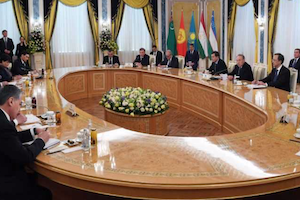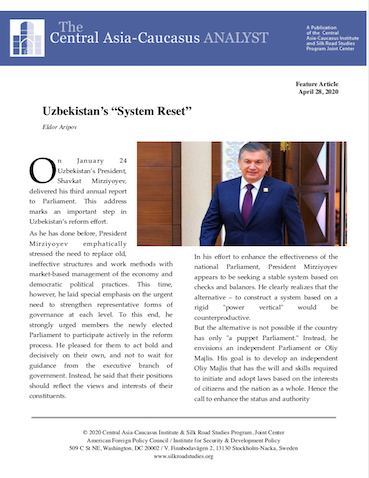Uzbekistan's "System Reset"
Uzbekistan's "System Reset"
By: Eldor Aripov
On January 24 Uzbekistan’s President, Shavkat Mirziyoyev, delivered his third annual report to Parliament. This address marks an important step in Uzbekistan’s reform effort.
As he has done before, President Mirziyoyev emphatically stressed the need to replace old, ineffective structures and work methods with market-based management of the economy and democratic political practices. This time, however, he laid special emphasis on the urgent need to strengthen representative forms of governance at each level. To this end, he strongly urged members the newly elected Parliament to participate actively in the reform process. He pleased for them to act bold and decisively on their own, and not to wait for guidance from the executive branch
of government. Instead, he said that their positions should reflect the views and interests of their constituents.
In his effort to enhance the effectiveness of the national Parliament, President Mirziyoyev appears to be seeking a stable system based on checks and balances. He clearly realizes that the alternative – to construct a system based on a rigid "power vertical" would be counterproductive.
But the alternative is not possible if the country has only "a puppet Parliament." Instead, he envisions an independent Parliament or Oliy Majlis. His goal is to develop an independent Oliy Majlis that has the will and skills required to initiate and adopt laws based on the interests of citizens and the nation as a whole. Hence the call to enhance the status and authority
of parliamentarians. To this end, also, he sharply broke with tradition by proposing a law that will oblige ministers to respond personally to requests from members of parliament.
Central Asia Nervously Awaits Withdrawal of Foreign Militaries from Afghanistan
By John C. K. Daly
April 8, 2020, the CACI Analyst
After 18 months of negotiations, the U.S. and the Taliban signed their bilateral landmark “peace agreement” in Doha on February 29, alongside representatives from more than 30 nations. Afghanistan’s northern neighboring post-Soviet states, Tajikistan, Uzbekistan and Turkmenistan, are concerned whether Afghanistan’s post-ceasefire instability will intensify and subsequently spill across the borders after foreign military missions withdraw. If the unrest roiling Afghanistan erupts into open military confrontation following the departure of foreign military forces, the question is whether the three nations alone can mount an acceptable response, particularly Turkmenistan whose international neutrality stance is recognized by the United Nations.
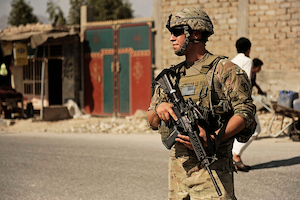
Uzbekistan's Significance in India's Central Asia Policy
By Niranjan Marjani
February 27, 2020, the CACI Analyst
Uzbekistan’s Foreign Minister Abdulaziz Kamilov visited India on January 14-15, 2020, where he met with his Indian counterpart Subrahmanyam Jaishankar and addressed the Raisina Dialogue, an international conference organized by India in which several foreign delegates share their views on global issues. This was one of several recent engagements between India and Uzbekistan. Uzbekistan has emerged as the Central Asian country with which India has not only accelerated but also diversified engagements in the past few years. This is evident from the increasing number of bilateral visits between the two countries as well as cooperation in an increasingly diverse number of areas.
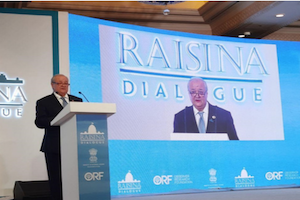
History Repeats Itself: Uzbekistan's New Eurasian Gamble
By Farkhod Tolipov
November 22, 2019, the CACI Analyst
During an official visit to Tashkent on October 2, 2019, the Speaker of the Federal Council of the Russian Federation, Valentina Matvienko, stated that Uzbekistan’s President Shavkat Mirziyoyev had decided to resolve the question of Uzbekistan’s membership in the Eurasian Economic Union (EEU). If Tashkent actually decides to join, this will be the most dramatic and fateful geopolitical turn in Uzbekistan’s post-Soviet history, since it will signify the transformation of a non-Eurasian country to an Eurasian one. This is, indeed, a moment of truth for Uzbekistan and its foreign policy since it will require public support and a clear explanation of the country’s national interests.
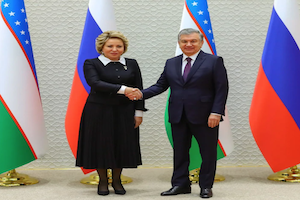
Central Asia: Delayed Consultations, Suspended Integration
By Farkhod Tolipov
July 2, 2019, the CACI Analyst
After almost a decade-long break in regional summits of Central Asian states, the ice began to melt in March 2018 when the leaders of five Central Asian states met in Kazakhstan’s capital Astana for a so-called Consultative Meeting. Many observers termed the event a revitalization of the regional cooperation process, albeit in a new temporary format for talks, and a cautious step toward a regional approach to regional problems. During that first Consultative Meeting, it was decided that the second meeting would take place in Tashkent in March 2019. However, when March came the meeting was rescheduled for April and is still delayed.
